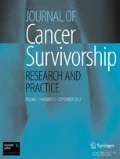Abstract
Purpose
This study aimed to establish and evaluate the referral pathway from a hospital-based oncology service to a multidisciplinary community-based health service supporting survivors to engage in self-management.
Method
The evaluation involved understanding patterns of health service utilisation and health professionals’ perspectives on the implementation of the community-based model of survivorship care, the Good Life Cancer Survivorship (GLCS) program. Survivors referred to GLCS were undergoing or had completed cancer treatment and unable to participate in intensive ambulatory oncology rehabilitation. Health service utilisation was tracked over 5 months, and the perspectives of health professionals referring to and involved in the GLCS program were recorded using semi-structured interviews.
Results
The oncology service made 25 referrals. The most accessed services at Carrington Health were physiotherapy with 18 appointments, followed by psychology (12) and dietitian services (11). Four themes emerged from the interviews: (1) Allied health services are relevant to people with cancer; (2) Education and information needs; (3) Communication gaps; (4) A one-stop multidisciplinary and holistic care model.
Conclusion
This project demonstrated that community health may be a valid setting to support cancer survivors in managing their health. Supporting ongoing awareness, education and understanding of services across both community and acute care settings will foster care coordination and strengthen referral pathways.
Implications for Cancer Survivors
Accessing appropriate community-based allied health services can support cancer survivors in developing self-management skills to manage their own health and improve their health outcomes and wellbeing in the survivorship phase.
Similar content being viewed by others
References
Australian Institute of Health and Welfare (AIHW). Cancer in Australia: In brief 2019. Canberra: AIHW; 2019. p. 174. Cancer series. no.119. Cat. no. CAN 123
Nekhlyudov L. Integrating primary care in cancer survivorship programs: models of care for a growing patient population. Oncologist. 2014;19(6):579–82.
Jacobsen PB. New Challenges in Psycho-Oncology Research II: a health care delivery, dissemination, and implementation research model to promote psychosocial care in routine cancer care. Psychooncology. 2017;26(4):419–23.
McCorkle R, et al. Self-management: enabling and empowering patients living with cancer as a chronic illness. CA Cancer J Clin. 2011;61(1):50–62.
Jefford M, et al. Implementing novel models of posttreatment care for cancer survivors: enablers, challenges and recommendations. Asia Pac J Clin Oncol. 2015;11(4):319–27.
Corbin J, Strauss A. Strategies for qualitative data analysis. Basics of Qualitative Research. Techniques and procedures for developing grounded theory. 2008;3.
Ugalde, A., et al., “An Ambition to Make People Feel at Home” or “The Emperor’s New Clothes”? Professional stakeholder views of wellness centres in cancer care. 2019: p. e13096.
Halpern MT, Argenbright KE. Evaluation of effectiveness of survivorship programmes: how to measure success? Lancet Oncol. 2017;18(1):e51–9.
Vardy JL, et al. Health status and needs of cancer survivors attending the Sydney Survivorship Centre clinics and programmes: a protocol for longitudinal evaluation of the centre’s services. BMJ Open. 2017;7(5):e014803.
Hordern A. et al, Discussing sexuality in the clinical setting: the impact of a brief training program for oncology health professionals to enhance communication about sexuality. 2009;5(4):270–7.
Funding
The project was supported by the Victorian Government. WK Soo is supported by a NHMRC Postgraduate Scholarship (APP1074676) and Eastern Health Clinical School Scholarship.
Author information
Authors and Affiliations
Contributions
Carina Martin, Janine Scott, Rebecca McIntosh, Wee Kheng Soo, Bernadette Zappa, Kerry Haynes, Anna Ugalde and Patricia Livingston contributed to the study conception and design. Material preparation, data collection, analysis and interpretation were performed by Rebecca McIntosh, Kerry Haynes, Lahiru Russell, Anna Ugalde and Patricia Livingston. Lahiru Russell wrote the first draft of the manuscript and all authors contributed and approved the final version of the manuscript.
Corresponding author
Ethics declarations
Ethics approval was obtained from the relevant institutions (Ethics# LR62-2018 and 2018-303).
Conflict of interest
The authors declare that they have no conflict of interest.
Disclaimer
The funders had no role in the study design, data collection and analysis, decision to publish, or preparation of the manuscript.
Additional information
Publisher’s note
Springer Nature remains neutral with regard to jurisdictional claims in published maps and institutional affiliations.
Rights and permissions
About this article
Cite this article
Russell, L., McIntosh, R., Martin, C. et al. A model of cancer survivorship care within a community health setting: the Good Life Cancer Survivorship program. J Cancer Surviv 14, 36–42 (2020). https://doi.org/10.1007/s11764-019-00821-6
Received:
Accepted:
Published:
Issue Date:
DOI: https://doi.org/10.1007/s11764-019-00821-6




